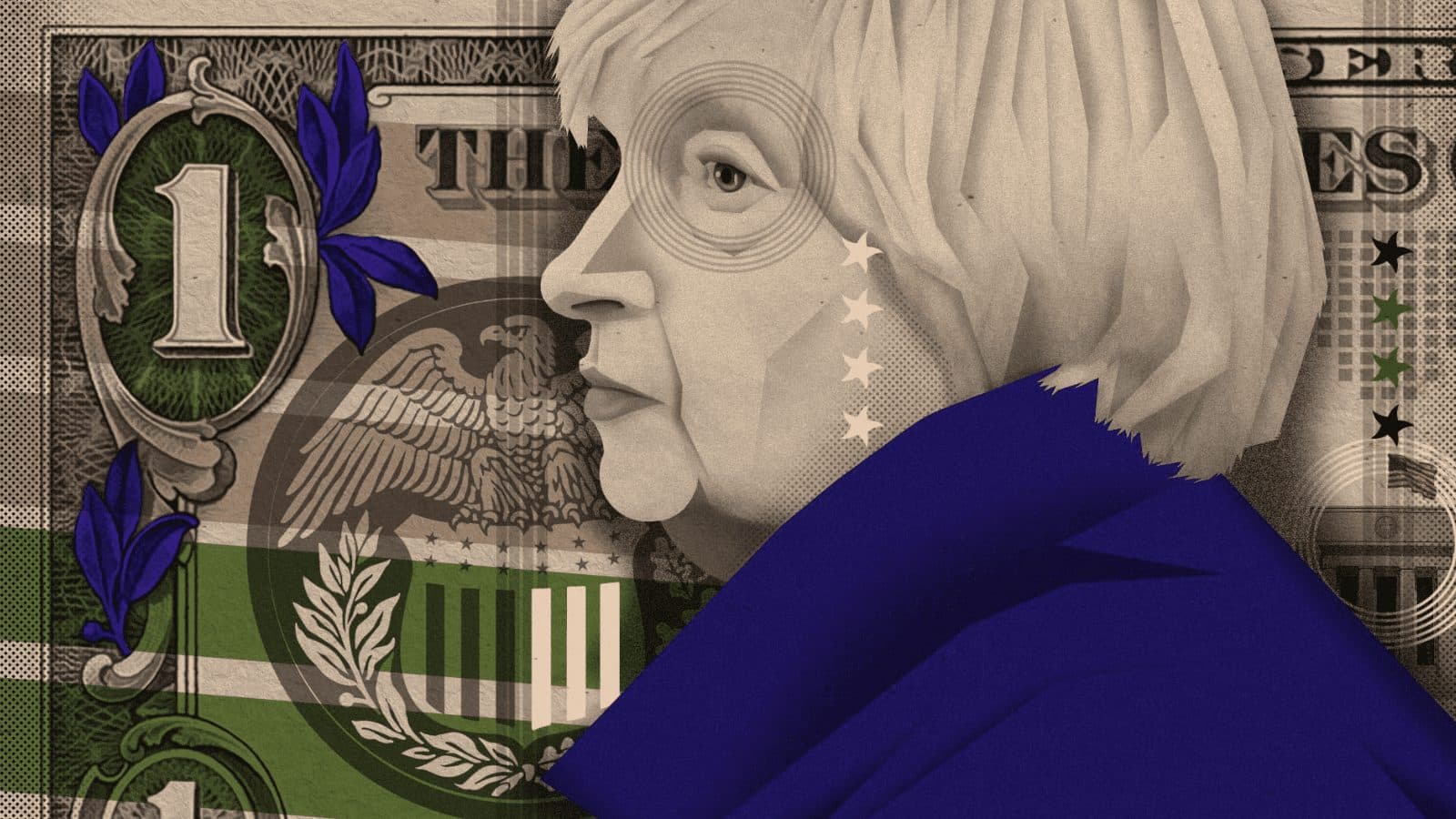US Democrats Ask Treasury What Effect Cryptoassets Have on Russian Sanctions
Sanctions aimed at deterring further conflict between Ukraine and Russia may be undermined by crypto, Democrats said Wednesday

BLOCKWORKS EXCLUSIVE ART BY AXEL RANGEL
key takeaways
- Democrats in the US are seeking answers from the Department of the Treasury over its effectiveness to monitor Russian evasion of sanctions using crypto
- Questions come as bitcoin’s rise against the ruble has skyrocketed in recent days
Four Democratic Senators have asked the Treasury to define its strategy for monitoring and enforcing crypto sanctions compliance following concerns Russia may be using digital assets to evade its economic penalties.
In a letter penned to Treasury Secretary Janet Yellen on Wednesday, Senators Elizabeth Warren, Mark Warner, Sherrod Brown and Jack Reed voiced their concerns that “criminals” and “rogue states” are using crypto as a “new means to hide cross-border transactions for nefarious purposes.”
The crisis in Ukraine has all but reenergized the US’s efforts to crack down on what it perceives as criminal-related crypto activity.
“Concerns have become even more urgent given the sanctions imposed on Russia after its invasion of Ukraine and reports that Russian entities are preparing to blunt some of the worst effects of the sanctions that have been levied on the country by using the array of “cryptocurrency-related tools as its disposal,” the letter said.
The Treasury defines sanctions as economic and financial tools of “first resort” used to address a number of threats to national security, foreign policy and the economic health of the US.
Following Russia’s invasion of Ukraine, the West has imposed economic restrictions on the former Soviet state, hoping to apply enough pressure elicit a ceasefire and troop withdrawal.
Sanctions, while not yet fully implemented, are already sending shockwaves across the global financial ecosystem with some assets fairing better than others.
As a result, Russia’s largest lender, Sberbank, lost 95% of its value on the London stock exchange on Wednesday following a run on deposits. Other London-listed stocks, including Lukoil, Novatek and Rosneft, also suffered significant hits. Russia’s ruble collapsed and is now trading at less than a penny ($0.0098).
In anticipation of the senators concerns, Jake Chervinsky, head of policy at the Blockchain Association, a Washington-based industry group, took to Twitter to argue that crypto cannot be used to mitigate sanctions.
In particular, he wrote, “US persons around the world are cutting ties with Russian [Specially Designated Nationals And Blocked Persons] right now, regardless of what payment systems they were using previously.”
“There’s zero reason to think crypto’s existence will convince any of them to willfully violate sanctions laws, risking fines & jail time.”
Meanwhile, crypto is reported to have responded favorably to affected Russian oligarchs and businesses seeking financial shelter.
“Trading volumes between the Russian ruble and Bitcoin have spiked to their highest level since May 2021 in recent days following the wave of sanctions announcements,” the senators said in their letter.
Democrats request more from crypto community
The letter also provides specific examples of what the US sees as the crypto community’s disregard for financial law.
One such instance includes mining company Marathon Digital’s refusal and then backflip in May over its decision to process transactions from wallets listed on the Office of Foreign Assets Control’s (OFAC) Specially Designated Nationals and Blocked Persons List.
OFAC is the Treasury’s financial intelligence and enforcement agency focused on issuing and enforcing sanctions based on US foreign policy and national security objectives.
Another instance included the mention of DeFi and its use of smart contracts, that seek to supplant brokers, banks and financial intermediaries, as a growing threat to financial stability and sanctions controls.
“The cryptocurrency industry may not be fulfilling its responsibility to comply with US sanctions,” the letter reads. “OFAC’s October guidance notes that many “members of the virtual currency industry implement OFAC sanctions policies and procedures months, or even years, after commencing operations.”
As such, the four Democrats said they are seeking information from the Treasury over measures the department is intending to take in relation to the OFAC’s guidance to enforce sanctions compliance by crypto participants.
Questions were also put forth by the senators to the Treasury including how OFAC works with foreign governments to ensure crypto does not avoid sanctions, challenges faced by the agency under the October guidance and how many times self-disclosed sanctions violations have occurred.
A further two questions were asked relating to how DeFi’s (decentralized finance) growth has contributed to “maligned actors'” ability to avoid sanctions and the agency’s capacity to enforce them as well as what further legal tools and funding are required to avoid Russia’s evasions.
The senators are requesting a response to their questions along with information by no later than March 23.
Get the news in your inbox. Explore Blockworks newsletters:
- The Breakdown: Decoding crypto and the markets. Daily.
- Empire: Crypto news and analysis to start your day.
- Forward Guidance: The intersection of crypto, macro and policy.
- 0xResearch: Alpha directly in your inbox.
- Lightspeed: All things Solana.
- The Drop: Apps, games, memes and more.
- Supply Shock: Bitcoin, bitcoin, bitcoin.





